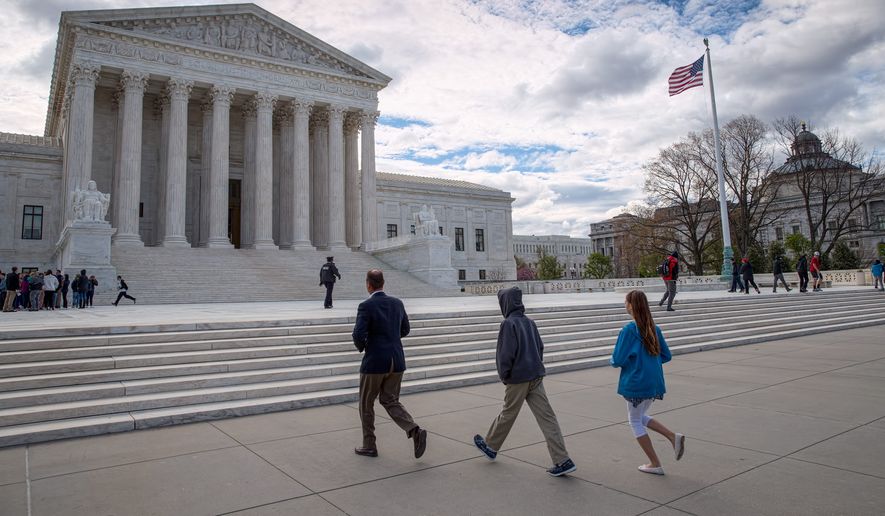The Justice Department petitioned the Supreme Court late Thursday to immediately reinstate President Trump’s extreme vetting policy, asking the justices to erase injunctions issued by several lower courts.
Mr. Trump’s lawyers said the president was acting within his national security powers when he issued his executive order in March halting admissions of most visitors from six majority-Muslim countries with ties to terrorism, and pausing admissions of refugees.
“We have asked the Supreme Court to hear this important case and are confident that President Trump’s executive order is well within his lawful authority to keep the Nation safe and protect our communities from terrorism,” Justice Department spokeswoman Sarah Isgur Flores said in a statement announcing the filing.
Federal courts in Hawaii and Maryland have blocked various parts of the executive orders. The Maryland judge’s decision has since been upheld by the 4th U.S. Circuit Court of Appeals, while the 9th Circuit is considering an appeal of the Hawaii judge’s ruling.
The Trump administration has asked the justices to take the case and swiftly erase both injunctions, allowing the policy to take effect.
Justice Department lawyers said Congress has granted the president wide latitude to decide who is allowed to be admitted to the U.S.
But judges — primarily those appointed by Democratic presidents — have faulted Mr. Trump for his campaign rhetoric promising a ban on Muslims, saying that even though the current order is not such a ban, the “animus” then-candidate Trump showed toward a religion still taints his actions today.
Mr. Trump’s lawyers said the court made a mistake by “attempting to delve into the president’s supposed true motives and pointed to the president’s speech last week in Saudi Arabia where “decried ’the murder of innocent Muslims.’”
Trump backers point to myriad majority-Muslim countries that aren’t singled out in the executive order as evidence it’s not animated by antipathy toward a religion, and Justice Department lawyers say many immigration decisions involve dividing persons based on their country of origin.
“The court erred in invalidating a religion-neutral order of the President not because of what it says or does, but because of what supposedly motivated the President (and his advisors) in issuing it,” the lawyers said.
In petitioning the high court, Mr. Trump sets up the first major test for newly installed Supreme Court Justice Neil Gorsuch.
The case is also likely to be a challenge for Chief Justice John G. Roberts Jr., who famously upheld Obamacare by refusing to look at President Obama’s rhetoric insisting the law wasn’t a tax. Instead, the Chief Justice, joined by four Democratic-appointed justices, said the law on its face was a tax no matter what Mr. Obama had said, so it was constitutional under the federal government’s taxing power.
In the case of the vetting order, Mr. Trump argues that regardless of campaign rhetoric, his latest version was carefully drawn to meet courts’ demands, and is on its face legal.
The revised order would put a 90-day halt to most admissions of visitors from Iran, Libya, Somalia, Sudan, Syria and Yemen — each country that was initially identified by Mr. Obama and the previous Congress as needing special scrutiny.
The revised order also imposes a 120-day pause on refugee admissions.
Civil liberties groups urged the high court to leave the lower court injunctions in place, saying those judges are serving as a check against a president trying to target a religion.
“Again and again, our nation’s courts have found that President Trump’s Muslim ban is unconstitutional,” said Karen Tumlin, legal director of the National Immigration Law Center.
• Stephen Dinan can be reached at sdinan@washingtontimes.com.




Please read our comment policy before commenting.